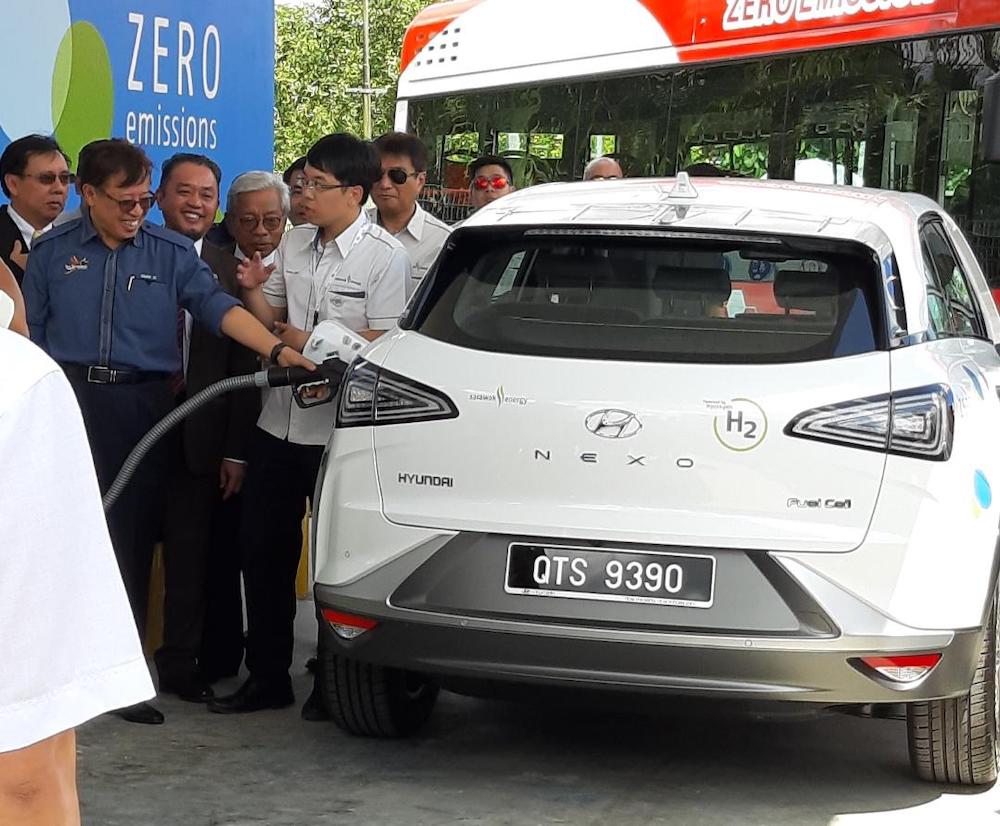KUCHING, May 27 — A significant milestone was achieved today for Sarawak’s Green Energy Agenda with the official launch of South-east Asia’s first integrated hydrogen production plant and refuelling station and the introduction of the state’s first hydrogen-powered vehicles.
The facilities includes a plant built by state-owned power provider Sarawak Energy Berhad that produces hydrogen through an electro-chemical process called electrolysis and a refueling station for Sarawak’s first hydrogen fuel cell electric buses, owned and managed by Sarawak Economic Development Corporation (SEDC).
Chief Minister Datuk Patinggi Abang Johari Openg, who launched the facility, said the state government allocated RM10 million to SEB to build the plant two years ago.
“Today, we have an integrated plant that has become a reality,” he said.
The facility was completed and operational in less than two years after he first announced that SEB would be undertaking research on hydrogen for energy-related applications in November 2017.
Abang Johari said he first raised the idea of applying hydrogen as energy given Sarawak’s competitive advantage in affordable and renewable power and ample water supply, and on the understanding that hydrogen would play a significant role in the future for mobility.
The construction and operation of the hydrogen plant and refuelling station was undertaken by SEB in collaboration with Linde EOX Sdn Bhd, a subsidiary of Linde Malaysia.
Linde Group is a leading German-based industrial gaseous and engineering company.
The chief minister said the state government is supporting the emission-free vehicle programme which is part of its long-term plan in ensuring that the public transportation system is operating on clean energy.
He said the use of clean energy, which is gaining momentum worldwide, is to protect the state’s environment.
He said the state government must do its part in reducing the current reliance on fossil fuel which has been proven to be unsustainable in the long run and is also bad for the environment.
“We must also realise that fossil fuels are declining by the day and it is irreplaceable,” he said, pointing out that fossil fuels are also causing long-term environmental damage and directly contributing to global warming.
SEDC chairman Tan Sri Abdul Aziz Husain, in his speech, said the corporation has secured three units of hydrogen fuel cell buses through working relationship with Foshan Feichi Automobile Manufacturing Co Ltd of China.
He said the buses are to be used as a pilot project to demonstrate the capabilities of hydrogen fuel cell technology as a viable form of public transportation in the state.
He said the buses will commence operation as soon as SEDC has received the necessary permits from the relevant authorities, including the Road Transport Department.
SEB chairman Datuk Amar Hamed Sepawi, in his speech, assured that the integrated plant has met all the safety compliance requirements.
“It was designed and built according to all relevant regulations, codes, standards and best practices referenced from design and operation of other international world class facilities,” he said.
He said the plant is able to produce 130kg of hydrogen per day at a purity of 99.999 per cent and is capable of supporting and fully refuelling up to five fuel cell buses and 10 fuel cell cars per day.
He said the plant’s medium pressure storage tank is able to store up to 150kg of hydrogen at 500 bar while the high pressure storage tank is able to store up to 19kg of hydrogen at 900 bar.
He said there are now five hydrogen fuel cell vehicles — three buses and two cars — which will be serviced by this facility.
Meanwhile, the chief minister said he has directed state-owned Petroleum Sarawak Berhad (Petros) to set up five more refuelling stations next year.
He said each station will supply diesel, petrol and hydrogen for fuel cell vehicles.



















